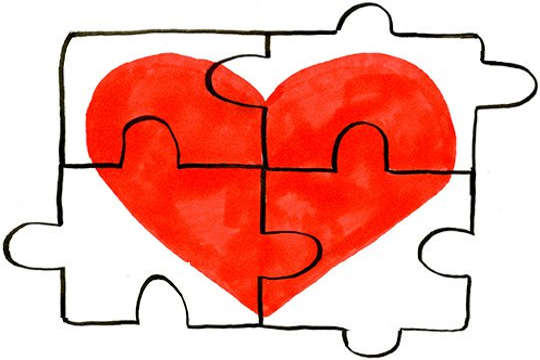
by Katarina Caspersen [CC BY-SA 4.0]
You may feel you do not need outside help and want to see how much progress you can make on your own. The results can often be dramatic when people start to love themselves, give up pretending, and really learn how to relax.
Two processes can happen spontaneously even when you are not having professional treatment: catharsis (the cleansing of the effects of pent-up emotions by bringing them to the surface of consciousness) and abreaction (the resolution of a neurosis by reviving forgotten or repressed ideas of the event that first caused it). It can be a little alarming if you don't know what is happening, but it should be welcomed. You will feel better as a result of it. The example of Paula, below, illustrates this trigger effect.
Paula's marriage was happy and she enjoyed her part-time work. She had suffered periods of depression all her life, although they were not disabling enough for her to seek help; she could still function. She went to a therapist for help when she was confused and depressed after her mother died.
She felt she was grieving normally for her mother, but was surprised by her mounting feelings of hate for her father. He had been dead for some years, and she thought she had forgotten about how miserable he made her young life. She started to dream about him, and would wake up feeling depressed. He filled her waking thoughts for days, and she could not even escape from him in sleep.
She was feeling particularly strung-out with premenstrual tension one day as she was coming home from work. The sound of piano-playing came through an open window. The memory it brought back made her feel sick with rage: she was nine years old, and being shaken violently by her father; he was angry because she was reluctant to practice the piano. Her timid mother always urged her to keep quiet and not upset her father.
After a few days of being restless and tearful, everything poured out. Her astonished husband came home to find her shouting abuse at her absent father for his cruelty, and to her absent mother for not protecting her. She was tearing up an old boxful of sheet music.
After the 'confetti' had stopped flying, she dissolved into tears, and said she felt a great sense of release; she now no longer needed to keep quiet about her misery. She could get rid of it. Although she knew her actions seemed childish, she continued expressing them because of the great sense of satisfaction they brought. Discharging so much pent-up emotion left her drained, yet feeling that she was true to herself for the first time in her life.
Cognitive Therapy: 'Change Your Thinking'
This treatment helps to overcome restrictions in everyday life by breaking the vicious circle of negative thoughts. Fear-provoking thoughts are changed by repeatedly replacing them with positive encouragement. Cognitive therapy takes various forms, as follows.
Self-Talk
This is just what the name implies. By repeating instructions to ourselves, either aloud or quietly, we can break negative thinking habits. If you were learning to play a new piece on the clarinet and stumbled repeatedly at the same phrase, practicing over and over again would correct the fault. We can do the same with our thoughts. It often helps to write them down, and to practice replacing negative thoughts with positive thoughts when you are relaxed, so that they become automatic when you are in troubling situations. For example, someone who is afraid of authority could practice intoning (mentally or out loud): 'I don't need to be afraid of people in charge any longer. I am not a child now, I am safe, my confidence is growing...
Choose any of the statements below that you feel are appropriate for you, and add others that would be helpful. Write them down on index cards, in your day-planner, or on pieces of paper. (You might want to think twice about posting them on the refrigerator or in your office cubicle.)
1. This crazy need to talk all the time means I am uptight and need to relax more.
2. I will be patient with myself. I will be in charge again.
3. Am I making this panic worse -- am I hungry, or breathing badly, or something? (Put this card in several places: on the fridge, on the bathroom mirror, on the television set...)
4. Don't moan on and on -- you know how stupid you feel afterward. (This card should go by the telephone.)
5. This is not my normal behavior. It will go. I have everything I need inside myself to get better. Every day in every way I am getting better and better. I am a wonderful person. I deserve good health.
Have you identified which fear is dragging you down? Some common ones are: death, authority, injury, illness, growing old, being alone, failure, success, responsibility, personal relationships, sexuality.
Negative Thoughts
Do some of your wayward thoughts also come from unrealistic expectations of how you or other people should behave? Have they crept up on you, and are they now so strong that they are affecting your life?
What are your expectations of others? How often are your demands unreasonable: 'I must be loved all the time'; 'If they don't do as I say, then they don't love me'; 'If he doesn't notice when I'm tired, or when my shoes are worn out, then he can't love me'; 'If she doesn't agree with everything I say, then she is against me'; 'I need total commitment in a relationship (does this mean total control').
What are your expectations of yourself? 'If I lose my temper no one will love me'; 'If I don't look my best he will not love me'; 'If I don't do everything she wants, she will leave me'; 'If I don't get good grades she will not love me'; 'If I don't go home for Christmas she will think I don't love her'; 'I must not be seen to be wrong'; 'I must not show weakness'.
Can you have too much reassurance and support? Ill people often need to be dependent for a time, but if this carries on too long it can stop their recovering -- a similar effect to prolonged drug therapy. The strain of having to uphold a nervous person for long periods can also have a serious effect on the health of the relatives or significant others.
People Dependency
People who are trapped by fearful or negative thoughts often seek constant reassurance. This affords only temporary relief, and the sufferer wants more and more. This could be termed reassurance neurosis or people dependency. This happens not only in the therapeutic situation, but also in personal relationships. Some people become so dependent on their partner, they cannot bear them to leave their side for a minute. This often puts a great strain on the marriage or relationship. The sufferer thinks only of how fearful they are, and even insists that the partner stays awake if they cannot sleep. Sometimes the sufferer refuses to be in the house alone and the partner has to arrange for a 'baby-sitter'.
If you feel your partner is being hard on you, it is much better to say so even if you risk their tears or anger. It is neither realistic nor helpful to take it all and say nothing, no matter how sympathetic you feel.
It is also very important not to let the sufferer talk endlessly about how they feel. Insist that they talk about symptoms only at certain times, say for ten minutes after dinner. They will be very angry at first and say you are unfeeling. Point out to them that they need to reach out to normality -- it won't just land in their lap.
Treatment for people dependency. The cognitive therapist encourages people to avoid seeking external sources of reassurance, teaching them the importance of reassuring themselves. Of course, it is unrealistic to expect sufferers to do this if you don't teach them to understand their nerves and how to relax.
Nothing can be more demoralizing than to need someone with you, or to need to be on the phone constantly, in order to get through the day. Use self-talk to cure this habit.
What About the Spirit?
A cheerful heart is good medicine
but a crushed spirit dries up the bones.
-- Proverbs 22
I find it difficult to talk about depression without mention of the spirit -- after all, we talk about being 'low-spirited' when we are 'gray' or 'blue', and though many reasons for depression have been discussed, I feel that for many people this state may come from a background of fear, an often unconscious state of being in continual fear. Much of this could be fear of death, of extinction, of being snuffed out like a candle, perhaps with the feeling that life is finite and that you have to strive to experience all, because there is only one chance.
I do not believe this. I believe we take with us into the next world -- a world much happier than this -- all that we need: love and learning.
What Is the Spirit?
My feeling is that the spirit is a part of our consciousness that, when we are born, stays in Heaven, the Universe, or however you choose to call it; and this is our Divine spark. It is the part of us that prompts us to love and learn and progress spiritually, probably through many lifetimes, toward the Godhead.
We hurt our soul by not loving ourselves, by not listening to the information in our dreams, and by seeing the pains of life as terrible misfortunes instead of as the tools we selected, before we were born, to carve out our chosen path.
Salvation comes when we learn to forgive and love ourselves as vulnerable human beings. Only when we do this can the memories be healed, can we be freed from negative emotions, and can we treat those around us with the same gentleness with which we treat ourselves.
Published by Ulysses Press/Seastone Books.
Ulysses Press, 800-377-2542.
http://ulyssespress.com
Article Source
Anxiety & Depression: A Natural Approach
by Shirley Trickett.
 Written in a clear and compassionate style, Anxiety and Depression: A Natural Approach puts the reader - not the drugs - in control. This second edition has been fully updated with the latest medical information and the newest alternative treatments, including herbal remedies, nutritional therapies, and meditation techniques.
Written in a clear and compassionate style, Anxiety and Depression: A Natural Approach puts the reader - not the drugs - in control. This second edition has been fully updated with the latest medical information and the newest alternative treatments, including herbal remedies, nutritional therapies, and meditation techniques.
Info/Order this book in English, or in Spanish from Amazon.
About The Author
Shirley Trickett has worked for over a decade with people trying to escape the cycle of anxiety and depression. She is the author of several health and psychology books, including "Panic Attacks: A Natural Approach".
More books by this Author
at InnerSelf Market and Amazon






















